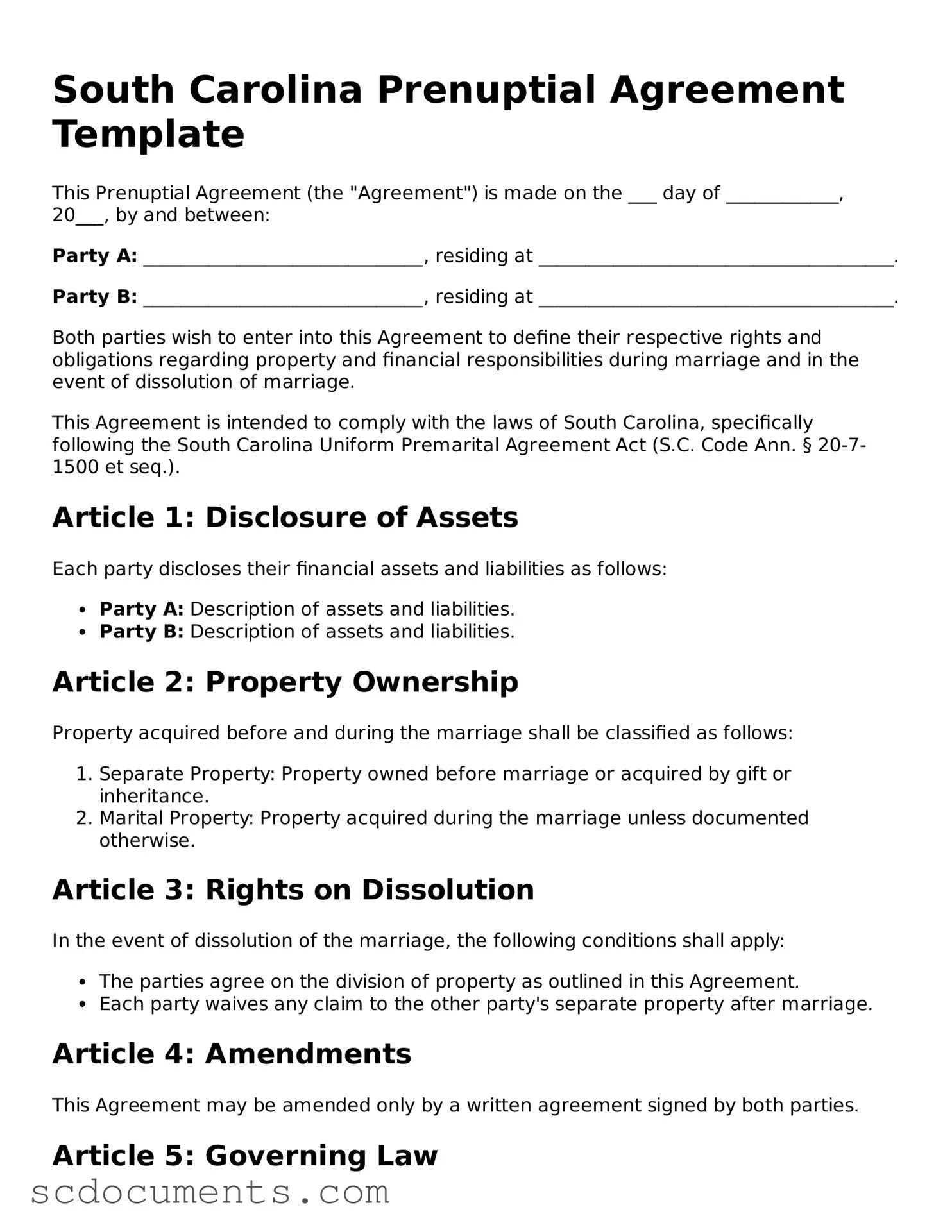Legal South Carolina Prenuptial Agreement Form
Dos and Don'ts
When filling out the South Carolina Prenuptial Agreement form, it's important to approach the process thoughtfully. Here are some guidelines to consider:
- Do communicate openly with your partner about your intentions and expectations.
- Don't rush the process. Take your time to understand the implications of the agreement.
- Do seek legal advice to ensure that the agreement is fair and legally sound.
- Don't hide assets or financial information from your partner. Transparency is key.
- Do ensure that both parties have independent legal representation to avoid conflicts of interest.
- Don't forget to review and update the agreement as circumstances change, such as after the birth of a child or a significant change in finances.
By following these guidelines, you can create a prenuptial agreement that serves both parties well and helps to establish a solid foundation for your marriage.
File Data
| Fact Name | Description |
|---|---|
| Definition | A prenuptial agreement is a contract made before marriage that outlines the division of assets and responsibilities in case of divorce or separation. |
| Governing Law | South Carolina law governs prenuptial agreements under the South Carolina Uniform Premarital Agreement Act. |
| Enforceability | For a prenuptial agreement to be enforceable, it must be in writing and signed by both parties. |
| Full Disclosure | Both parties must provide a fair and reasonable disclosure of their financial situations for the agreement to be valid. |
| Voluntary Agreement | The agreement must be entered into voluntarily, without coercion or undue pressure from either party. |
| Legal Representation | It is advisable for both parties to seek independent legal counsel before signing a prenuptial agreement. |
| Modification | Prenuptial agreements can be modified or revoked at any time, but changes must also be in writing and signed by both parties. |
| Judicial Review | A court may review a prenuptial agreement for fairness and can invalidate it if it finds it unconscionable. |
| Property Division | The agreement can specify how property will be divided, including marital and separate property designations. |
| Debt Responsibility | It can also outline how debts will be handled, protecting one party from the other's financial obligations. |
Documents used along the form
A prenuptial agreement is an important document for couples planning to marry. It outlines the financial rights and responsibilities of each partner during the marriage and in the event of a divorce. Several other forms and documents often accompany a prenuptial agreement to ensure that all aspects of the relationship are legally covered. Here are some of the most common ones:
- Postnuptial Agreement: Similar to a prenuptial agreement, this document is created after marriage. It addresses the same issues but is useful if circumstances change after the wedding.
- Financial Disclosure Statement: This form details each partner's financial situation, including assets, debts, and income. Transparency in finances is crucial for a fair prenuptial agreement.
- Articles of Incorporation: To legally establish your business in Ohio, our comprehensive Articles of Incorporation template provides essential guidance for accurate submission.
- Separation Agreement: If a couple decides to separate, this document outlines the terms of their separation, including asset division and support arrangements.
- Divorce Agreement: This is a comprehensive document that finalizes the terms of a divorce, including property division, child custody, and spousal support.
- Will: A will specifies how a person's assets will be distributed upon their death. It is important for couples to have wills that reflect their wishes, especially after marriage.
- Power of Attorney: This document allows one partner to make financial or medical decisions on behalf of the other in case they become incapacitated.
- Living Trust: A living trust helps manage assets during a person's lifetime and ensures a smooth transfer of assets upon death, avoiding probate.
Each of these documents plays a vital role in protecting the interests of both partners. Understanding and preparing these forms can lead to a clearer and more secure future for couples entering into marriage.
Key takeaways
When considering a prenuptial agreement in South Carolina, it's essential to understand the process and implications. Here are six key takeaways to keep in mind:
- Understand the Purpose: A prenuptial agreement outlines how assets and debts will be divided in the event of divorce or separation. It can protect both parties and provide clarity.
- Full Disclosure is Crucial: Both parties must fully disclose their assets, liabilities, and income. This transparency helps ensure the agreement is enforceable.
- Legal Requirements: South Carolina law requires that prenuptial agreements be in writing and signed by both parties. Oral agreements are not valid.
- Consider Timing: It’s best to complete the agreement well before the wedding date. Rushing can lead to misunderstandings or claims of coercion.
- Seek Legal Counsel: Consulting with a legal professional is advisable. They can help tailor the agreement to meet specific needs and ensure compliance with state laws.
- Review and Revise: Life circumstances change. Regularly reviewing and updating the agreement can help maintain its relevance and effectiveness.
By keeping these points in mind, individuals can navigate the process of creating a prenuptial agreement with greater confidence and understanding.
Other South Carolina Templates
Sc Llc Application - Articles must be filed with the correct state authority to formalize incorporation.
South Carolina Rental Agreement - Terms regarding tenant responsibilities for cleaning and upkeep can be included.
To ensure protection against potential liabilities, consider utilizing a tailored Hold Harmless Agreement template that suits your specific needs. For further guidance on this important document, check out the comprehensive Hold Harmless Agreement template available at Missouri Legal Templates.
Sc Dnr Boat Registration - The form may specify whether taxes have been paid on the sale.
